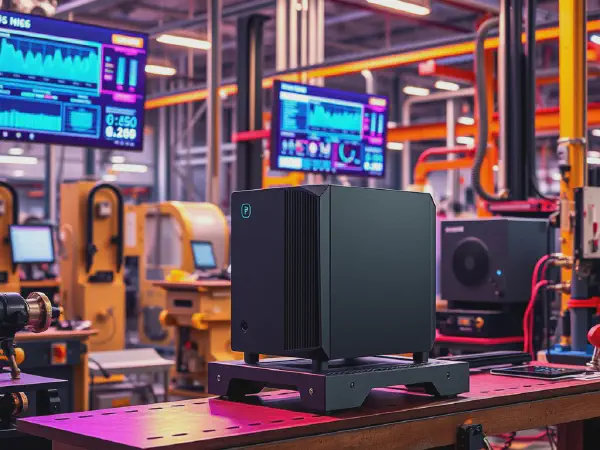Explore the Benefits of Fanless Industrial PCs Today

A Comprehensive Guide to Fanless Industrial PCs
Fanless Industrial PCs represent a groundbreaking shift in industrial computing solutions, providing enhanced performance without traditional cooling mechanisms. These innovative devices eliminate the need for fans, relying instead on passive cooling techniques. This design choice significantly benefits industries that operate in harsh and dusty environments, where conventional PCs are typically prone to overheating and failure.
The evolution of Fanless Industrial PCs has been driven by the increasing demand for reliable, efficient, and durable computing platforms across various sectors. As industries seek to modernize their operations with technology, Fanless Industrial PCs offer an optimal solution, combining energy efficiency, reduced noise, and longevity. With advancements in processor technology and materials, these PCs are capable of handling the rigorous tasks often required in industrial settings, making them a popular choice for automation and control systems.
The pdf temperature data logger offers precise monitoring capabilities crucial for maintaining optimal product quality.
The compact and robust design of Fanless Industrial PCs allows for seamless operation in confined spaces, ensuring that they can be deployed in locations where traditional PCs would struggle. Their ability to operate without moving parts minimizes the risk of mechanical failure, providing users with peace of mind in mission-critical applications. Overall, Fanless Industrial PCs are rapidly gaining traction as the preferred computing solution for industries aiming to boost productivity while maintaining operational integrity.
The versatility of Fanless Industrial PCs makes them suitable for a wide range of applications, from factory automation to environmental monitoring. Their design accommodates various input and output options, facilitating integration with existing industrial equipment. As more companies recognize the benefits of deploying Fanless Industrial PCs, the market continues to expand, leading to innovative designs and features tailored to specific industry needs.
Investing in an industrial pc can enhance the efficiency of your manufacturing processes significantly.
In conclusion, Fanless Industrial PCs represent a revolutionary advancement in industrial computing, addressing the unique challenges faced by industries worldwide. With a focus on energy efficiency, durability, and versatility, these devices are setting new standards in performance and reliability, paving the way for a future where industrial computing is smarter, quieter, and more efficient than ever.
Advantages of Fanless Industrial PCs
One of the most notable advantages of Fanless Industrial PCs is their energy efficiency. By eliminating the need for fans, these devices consume less power, translating to lower operating costs and a smaller carbon footprint. This energy efficiency is particularly beneficial for industries looking to improve their sustainability efforts and reduce utility expenses.
Another significant benefit of Fanless Industrial PCs is the reduced noise levels they operate at. In environments where noise pollution can disrupt operations or affect worker health, fanless designs provide a quieter alternative. This aspect is especially important in settings like laboratories, hospitals, and manufacturing facilities, where maintaining a tranquil atmosphere is crucial.
Utilizing esis software streamlines operations and fosters real-time data analysis for better decision-making.
Fanless Industrial PCs boast improved reliability and lifespan when compared to conventional PCs. The absence of moving parts means there's a lower risk of mechanical failure, allowing these devices to deliver consistent performance over extended periods. This reliability translates to less downtime and fewer disruptions in critical applications.
Additionally, Fanless Industrial PCs incur lower maintenance costs due to their simpler construction and fewer moving parts. Organizations can enjoy reduced service costs and fewer interruptions in their operations, which is particularly advantageous in high-stakes industrial environments where every moment counts.
Applications of Fanless Industrial PCs
Fanless Industrial PCs are especially adept at functioning in harsh environmental conditions. Their rugged design allows them to withstand extreme temperatures, humidity, and exposure to dust or debris, making them ideal for use in outdoor applications or factories where environmental control is challenging.
In the realm of automation and control systems, Fanless Industrial PCs play a vital role in managing processes efficiently. Their reliability in communication and control tasks ensures that industrial machinery and systems operate smoothly, reducing the risk of errors that could lead to costly downtime.
The integration of Fanless Industrial PCs in Internet of Things (IoT) devices showcases their versatility and adaptability. With the ability to connect and communicate with a vast array of sensors and devices, these computers act as central nodes, gathering and processing data to facilitate smarter decision-making in real-time.
In manufacturing processes, Fanless Industrial PCs are deployed to monitor and control machinery, enhancing operational efficiency. By ensuring reliable performance in demanding environments, fanless systems contribute to streamlined production lines and improved product quality.
Design Features of Fanless Industrial PCs
Fanless Industrial PCs are designed with compact form factors that allow for efficient use of space, especially in environments where real estate is limited. Their small footprint enables easy installation in various locations, from factory floors to control panels.
The robust construction of Fanless Industrial PCs is another key design feature, ensuring durability and protection from external factors. These devices are often encased in strong materials that can withstand impacts and vibrations, making them suitable for mobile or stationary applications in challenging settings.
Thermal management without fans is a hallmark of Fanless Industrial PCs. These systems utilize advanced heat dissipation technologies, such as heat sinks and thermal conduction, to maintain optimal operating temperatures without the noise and potential failure associated with traditional fans.
A variety of input/output options are available in Fanless Industrial PCs, allowing them to connect to numerous peripherals and industrial equipment. This flexibility facilitates seamless integration into existing systems and enhances their adaptability across different applications.
Comparison with Conventional PCs
When comparing performance metrics, Fanless Industrial PCs often hold their own against conventional PCs. Although they may have less raw processing power, their efficient designs and specialized components enable them to perform consistently in industrial tasks that require reliability rather than maximum speed.
From a cost analysis perspective, Fanless Industrial PCs tend to have lower operational expenses over time due to their energy efficiency and reduced maintenance needs. While the initial investment may be higher, the long-term savings become apparent through decreased energy costs and fewer repairs.
Maintenance and operational differences highlight the advantages of Fanless Industrial PCs. Their lack of moving parts results in lower failure rates, minimizing the need for periodic servicing. Conventional PCs, with their fans and other moving components, often require more attention and maintenance, leading to increased downtime and operational disruptions.
Suitability for various industries is another consideration where Fanless Industrial PCs excel. They are designed to meet the diverse needs of sectors such as manufacturing, healthcare, transportation, and energy, making them highly versatile solutions for a range of applications.
Future Trends in Fanless Industrial PCs
Looking towards the future, advancements in cooling technology are likely to drive the evolution of Fanless Industrial PCs. As new materials and designs are developed, even greater efficiency and performance can be achieved, further establishing the fanless architecture as a standard in industrial computing.
Trends in energy efficiency will continue to influence the design and functionality of Fanless Industrial PCs. With increasing awareness of environmental impacts, manufacturers will prioritize sustainable solutions that offer improved energy performance without compromising on capability or reliability.
The integration of AI and machine learning technologies into Fanless Industrial PCs is anticipated to grow, leading to smarter, more intuitive systems capable of predictive analysis and autonomous operation in industrial settings. This integration promises to enhance operational efficiency and decision-making processes.
Finally, the growth of edge computing applications will further solidify the role of Fanless Industrial PCs in the modern industrial landscape. As industries seek to process data closer to the source, the need for compact, efficient computing solutions will rise, aligning perfectly with the capabilities offered by fanless systems.
